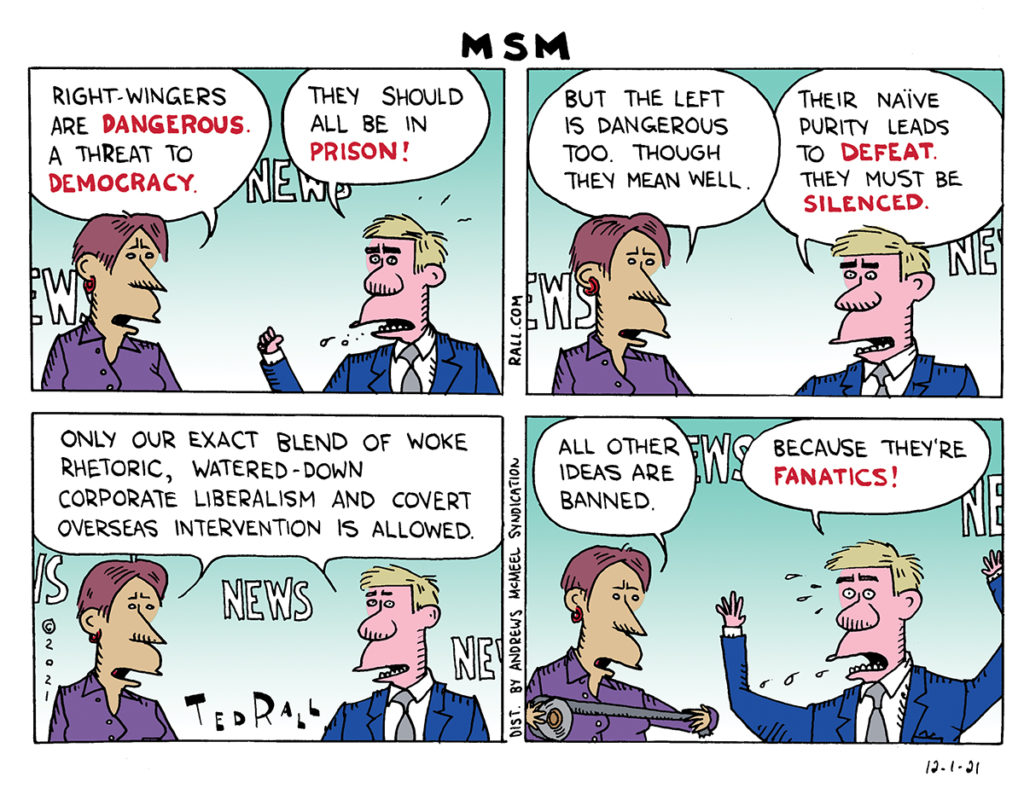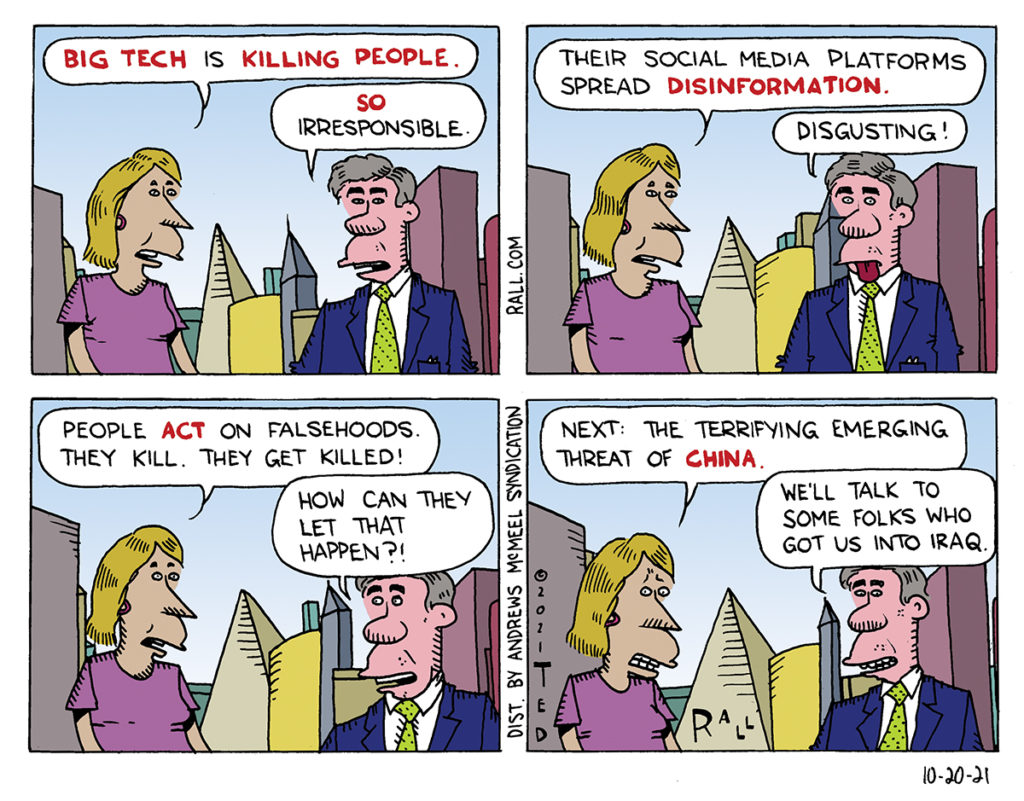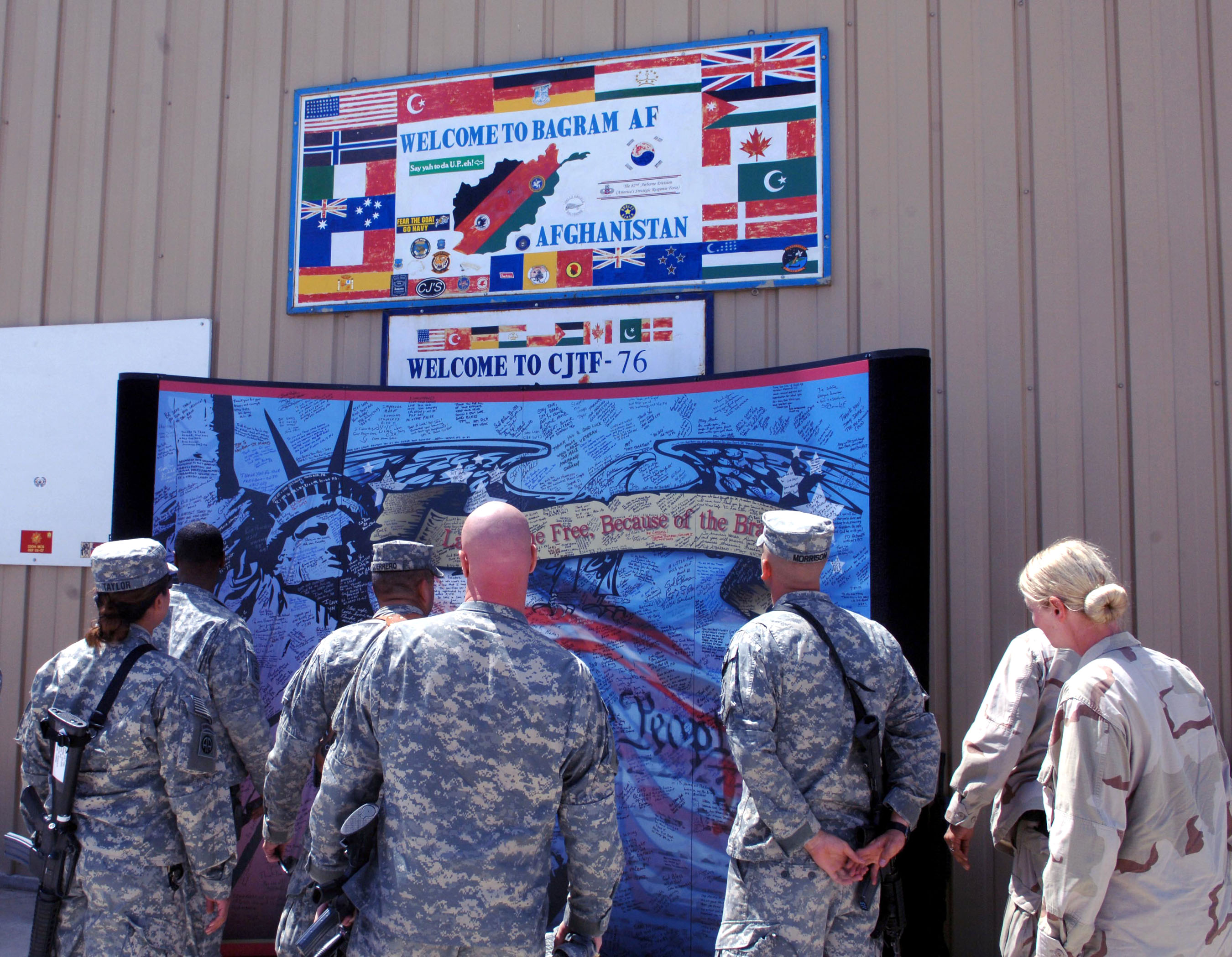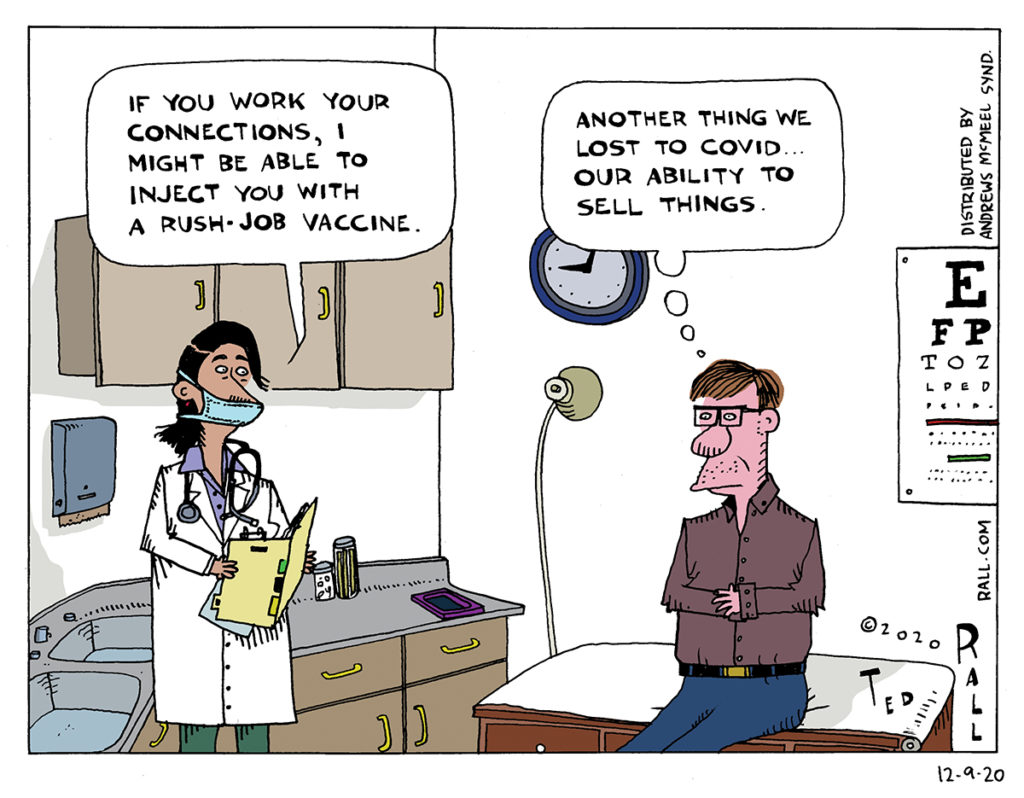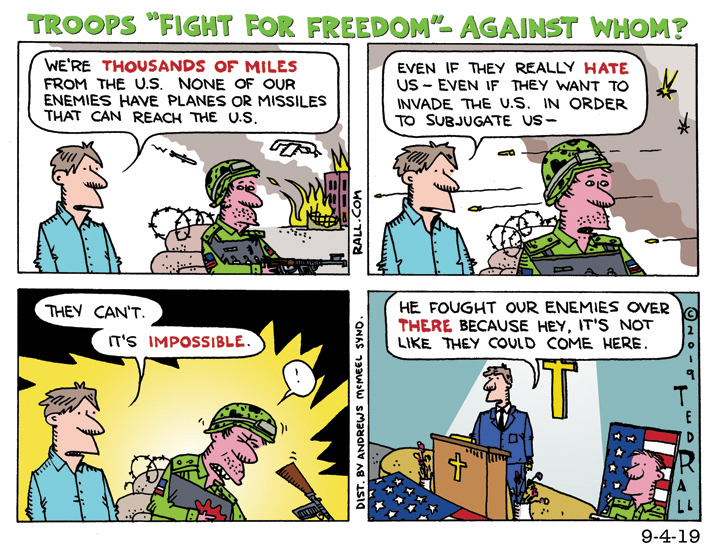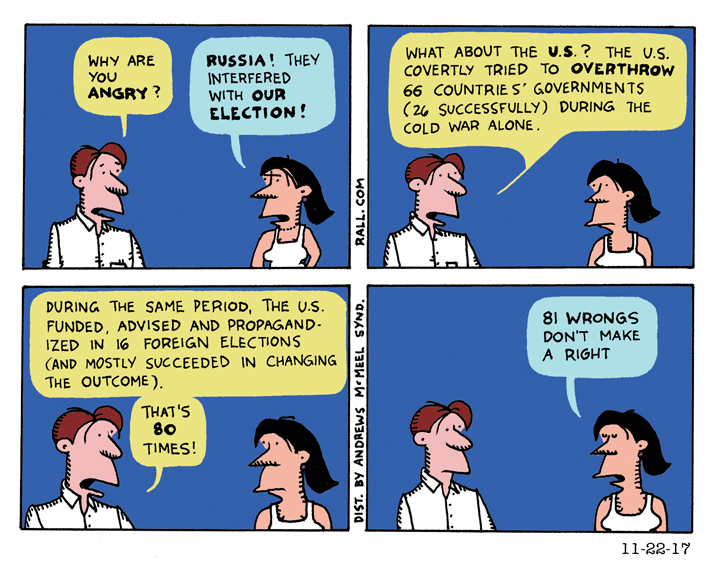Political centrists, including those who run the mainstream corporate media, position themselves as reasonable and more rational than proponents of ideas to their left or to the right. But the militant moderates are fanatics in their own right, closed to any possibility that they might be mistaken and willing to ruthlessly crush opposing views.
Big Tech Is Killing People
The Wall Street Journal has published “the Facebook papers,” which revealed that Facebook and other big technology companies have been more than willing to monetize disinformation and misinformation, even when it needs to people’s deaths. Legacy media is laughing, but they should look at themselves too.
Colin Powell, Moral Weakling

If Colin Powell’s life has meaning, it is as a cautionary tale about the perils of going along to get along.
Rarely has history offered such a stark example of a human being offered a clear existential choice between right and wrong. Hardly ever has so much hung in the balance for humanity and for an individual’s soul, as when then-secretary of state Colin Powell spoke to the United Nations to make the case for war.
It would be impossible to overstate the import of Powell’s February 2003 speech, in which he claimed that the United States had amassed a stockpile of evidence that proved that Iraq had retained chemical and biological weapons of mass destruction in violation of its commitments under the 1991 Gulf War ceasefire. Iraq’s government, Powell argued forcefully, presented such a clear and present danger to its neighbors that the international community—led by the U.S.—had a right, even a duty, to remove it with an invasion. President George W. Bush and his co-conspirators had spent the better part of the previous year working to convince Americans to support a second war against Iraq over WMDs. Polls showed that voters remained unconvinced.
Possibly in preparation for a 2004 White House run—hard to imagine in these polarized times, but the ex-general had long been considered a top presidential prospect by both major political parties—the even-tempered Powell had previously distanced himself from his fellow cabinet members, dominated as they were by neoconservative hotheads, throughout the first two years of his term. Powell’s credibility towered over everyone else in American politics to an extent rarely seen before and certainly never since.
When you join a gang, you’re required to prove your loyalty. “You’ve got high poll ratings,” Vice President Dick Cheney told Powell as he ordered him to support the push for war. “You can afford to lose a few points.”
Which is why Bush and Cheney sent him to the U.N. They knew that Powell alone could close the deal with a public made recalcitrant by historical precedent: the U.S. had never before launched a full-out war without a pretext that made some sort of sense. And Where the president had failed the prestigious Powell succeeded brilliantly, with the American public as well as with key allies like Great Britain and Australia. Seconds after he stopped talking, TV talking heads told us what we already knew: the fate of a million Iraqis was sealed. We were going to war.
There is an alternative universe in which Powell takes to the podium and tells the truth: there was no credible evidence that Iraq still had WMDs. I have often imagined the stressed-out secretary of state, music swelling Hollywood-style, beginning to read the litany of lies about anthrax, chemical decontamination trucks, falsified Iraqi death certificates and cooperation between Saddam and Al Qaeda—an alliance that not only was not true but could not have been true—before tearing up his prepared remarks. The statesman stares into the camera and speaks the words that would have saved a million lives, assured his place in history as a Profile in Courage™ and gotten him elected president by a landslide: “They told me to come out and lie to you. I will not. I swore to protect the Constitution of the United States, not the President of the United States, so help me God, and there is no evidence that Iraq has weapons of mass destruction.”
Powell’s defenders blame Bush. They say Powell was lied to, conned.
Powell fed the rube narrative in his 2012 memoir. “I am mad mostly at myself for not having smelled the problem. My instincts failed me,” he wrote, referring to the intelligence report he used for his U.N. speech that contained false evidence of supposed Iraqi WMDs. Powell never apologized.
Actually, Powell’s instincts were on point. His conscience went missing.
He knew it was all a lie.
At the time.
The weekend before his speech, Powell exploded in frustration as he read the manufactured intel reports he had been given by the Bushies. “I’m not reading this. This is bullshit!” he shouted, throwing the cherry-picked documents in the air. Then he picked himself up, took a deep breath and went out and lied the world into a war that would forever soil America’s reputation.
Weakness was baked into Powell’s personality early on. As a young officer serving in Vietnam Powell played a minor but telling role in covering up a soldier’s report about war crimes and other atrocities committed by U.S. troops during the same period as the My Lai massacre. Rather than investigate the allegations, which were accurate, Powell smeared the whistleblower as a coward. The whistleblower’s career faltered as Powell’s soared.
Powell’s memoir made clear that he understood the gravity of his shilling for the Iraq War. “It was by no means my first, but it was one of my most momentous failures, the one with the widest-ranging impact,” he wrote. “The event will earn a prominent paragraph in my obituary.”
(Ted Rall (Twitter: @tedrall), the political cartoonist, columnist and graphic novelist, is the author of a new graphic novel about a journalist gone bad, “The Stringer.” Order one today. You can support Ted’s hard-hitting political cartoons and columns and see his work first by sponsoring his work on Patreon.)
9/11 Had Nothing to Do with Afghanistan
Better late than never: most Americans now believe that invading Afghanistan was a mistake. But what good does it do to recognize a screw-up unless you learn from it?
Failure to understand what went wrong, and why, sets you up for doing the same thing later. That’s what happened after Vietnam; rather than face up to the truth that we went there to prop up a corrupt puppet regime and exploit natural gas, we wallowed in ridiculous “Rambo” mythology about politicians stabbing our valiant warriors in the back by not allowing them to win, and libels of vicious hippies who supposedly spat on veterans returning to their hometown airports. (Never happened.)
It’s tempting to kick the dust of Afghanistan off our metaphorical boots and, as Americans prefer, look forward rather than backward. But an advanced civil society requires an after-action report. That’s what the military and other organizations do after an engagement in an intelligent effort to repeat what worked and avoid what didn’t.
Unless we conduct a sober reassessment of Afghanistan, ideally in the form of a congressional investigation, there is nothing to indicate that we wouldn’t start a similarly stupid war again in the future. That’s because the invasion and occupation of Afghanistan was based on a big lie — and that lie is still circulating as widely as it was when the first bombs started raining down on Kabul in October 2001. If we want to avoid another $2 trillion war that claims thousands of American lives, we have to drive a stake through that BS narrative.
Big Lie: Afghanistan and the war against it was revenge for 9/11.
American voters like wars that are framed as righteous retribution against unprovoked acts of naked aggression, like the Spanish-American War (“remember the Maine!”) and World War II in the Pacific (“remember Pearl Harbor!”). Never mind that we invaded Cuba over an accidental explosion that Spain almost certainly had nothing to do with and that a U.S.-led oil embargo drove Japan to the desperate act of bombing Hawaii. A war that seems to come out of thin air, like the Bush Administration’s 2003 invasion of Iraq, on the other hand, prompts big protests and widespread opposition.
So it’s easy to see why the White House and its press allies marketed the Afghan war as revenge against Al Qaeda. We were attacked. It was unprovoked (not really, but that’s what Americans thought). We had to strike back.
Al Qaeda was based in Pakistan. 9/11 was planned in Pakistan. Osama bin Laden, the man held most responsible, lived in Pakistan. Much of the money came from Saudi Arabia, by far the largest international funding source of radical Islamic fundamentalism. The hijackers were Saudi and Egyptian. Not a single hijacker was Afghan. The hijackers had attended training camps in Afghanistan for jihad generally, not 9/11 specifically. If we were interested in getting even for 9/11, we would have attacked Pakistan or Saudi Arabia instead.
This information is well-known and widely available. Yet President Joe Biden, who deserves accolades for sticking to his guns and pulling out U.S. troops, chose September 11, 2021 as the final deadline for the withdrawal and the official end date of the war. “Setting the 9/11 date…underscores the reason that American troops were in Afghanistan to begin with — to prevent extremist groups from establishing a foothold in the country again that could be used to launch attacks against the U.S.,” the Associated Press reported on April 14th.
“Again”?!
There it is, 20 years later, the big lie again. 9/11 wasn’t planned by terrorists from a “foothold” established in Afghanistan. It was planned by terrorists from a foothold established in Pakistan, specifically in the city of Karachi, precisely at the home of Khalid Sheikh Mohammed.
In total opposition to the facts, Biden keeps repeating the big lie. “As I said in April, the United States did what we went to do in Afghanistan: to get the terrorists who attacked us on 9/11 and to deliver justice to Osama Bin Laden, and to degrade the terrorist threat to keep Afghanistan from becoming a base from which attacks could be continued against the United States. We achieved those objectives. That’s why we went.”
Afghanistan never was a “base” of attacks against the United States; said attacks couldn’t possibly “continue” because there never were any originating from Afghanistan. Bin Laden, of course, was assassinated in Pakistan. Which is an entirely different country from Afghanistan. And no, we didn’t follow any trail from Afghanistan to Pakistan.
Biden piles on the lies. People remember symbolism.
Choosing the 20th anniversary of the 9/11 attacks as the official withdrawal date was the White House’s way to reinforce the long-standing national slander against Afghanistan, while leaving our frenemies Pakistan and Saudi Arabia off the hook.
We have got to stop talking about 9/11 and Afghanistan in the same breath.
The lie that links Afghanistan to 9/11 is so powerful that even people on the progressive left bought into it. Only one member of Congress, Barbara Lee of California, had the courage and brains to vote against the Afghanistan war. The antiwar left cobbled together a few pathetic protest demonstrations during the September-October 2001 run-up to the U.S. invasion, but their number and turnout was a tiny fraction of those who marched against the Iraq War. Even now that it’s clear that both wars were equally unjustified and based on lies, liberals get much more agitated over Iraq than Afghanistan.
As usual, the media is the guiltiest cog in the machine of militarism. “Americans like me ignored—or scorned—protesters who warned of an endless quagmire in Afghanistan. Next time, we should listen to the critics,” Conor Friedersdorf kindly acknowledged in The Atlantic in 2019. Perhaps that will happen somewhere somehow. But not in The Atlantic. Like every other corporate media outlet, the magazine refuses to hire me or any other writer or artist who criticized the Afghanistan war when everyone else was all in.
(Ted Rall (Twitter: @tedrall), the political cartoonist, columnist and graphic novelist, is the author of a new graphic novel about a journalist gone bad, “The Stringer.” Now available to order. You can support Ted’s hard-hitting political cartoons and columns and see his work first by sponsoring his work on Patreon.)
Will the Media’s Newfound Stridency Continue under Biden? No.
 “In his first rally since losing the election last month, President Trump continued to spout conspiracy theories about voter fraud, falsely claiming that he had defeated President-elect Joe Biden.” That was the lede of a news story in the December 5thWashington Post.
“In his first rally since losing the election last month, President Trump continued to spout conspiracy theories about voter fraud, falsely claiming that he had defeated President-elect Joe Biden.” That was the lede of a news story in the December 5thWashington Post.
The Associated Press took a similar tack. “President Donald Trump flooded his first postelection political rally with debunked conspiracy theories and audacious falsehoods Saturday as he claimed victory in an election he decisively lost,” began the wire service’s coverage.
You’ll find similarly opinionated news coverage about Donald Trump in almost every issue of many major newspapers over the last several years. It’s easy to see why many of the president’s supporters don’t trust the mainstream news media to be fair to conservatives.
You may long for a return to the days when too many reporters played the role of government stenographers, striving for a neutral tone while dutifully regurgitating the most ridiculous nonsense spewing out of the maws of official propagandists. Not me. Busy news consumers rely on journalists to frame and explain current events, not just reorganize press releases. Skepticism of presidents and labeling of their obvious lies is long overdue.
From Obama’s “if you like your healthcare plan, you can keep it” to Dick Cheney’s “there is no doubt that Saddam Hussein now has weapons of mass destruction,” the public would have benefited from news accounts that emphasized that these claims not only were not true but could not be true. As reporters knew, Obamacare was structured in a way that made it impossible for many pre-existing health insurance plans to remain financially viable within the system. There is always doubt in the military intelligence business. The credulous tone of this reporting enabled the mass misleading of the American people. Hundreds of thousands of Iraqis died as a result.
So when it comes to Trump, better late than never. But will journalists’ newfound courage survive into the Biden years? Early indications are discouraging.
Throughout the general election campaign journalists were unduly solicitous as the Democratic nominee generally shunned one-on-one interviews with major news organizations. In July, Biden only granted ten TV interviews, nine of which were with local outlets. Despite being the oldest major party candidate ever to run for president and repeated stumbles and verbal slips on the campaign trail, he faced few questions about his physical health or mental acuity. Liberal-leaning journalists largely dismissed Hunter Biden’s fiscal adventures in Ukraine as the product of the fevered imagination of far-right conspiracy theorists; Twitter and Facebook even censored a New York Post story about it. Now that a federal investigation into his taxes has been announced, Hunter is clearly a legitimate line of inquiry. Yet the issue is still not getting much coverage.
Accounts of Biden’s cabinet choices appear to harken a return to the stenographer days. Many praise the president-elect’s effort to increase “diversity” in a cabinet Democrats say will “look like America” while ignoring one type of diversity: ideological. Though Biden’s top advisers will include many women and some people of color, there is no indication that a single progressive will be in the room while he decides the fate of the nation.
Stories about Pete Buttigieg’s nomination as secretary of transportation bury the elephant in the room. “President-elect Joe Biden will nominate former Democratic presidential candidate Pete Buttigieg to be Transportation secretary…” Politico began its story. “Buttigieg’s ascension to the top spot at DOT marks the culmination of a meteoric rise in politics over the last two years from the mayor of South Bend, Ind., to the first openly gay Cabinet secretary, if he is confirmed.” A reference to Buttigieg’s “thin transportation policy resume” appears in paragraph five.
Had the story been about Trump’s cabinet pick, it likely would have begun something like: “Overlooking experienced transit experts, President-elect Joe Biden instead turned to a young loyalist who helped hand him the nomination, former South Bend, Ind. mayor Pete Buttigieg, to head the transportation department. South Bend, a city of 100,000, has a fleet of 60 buses.” Tone matters.
All presidents lie. Biden lies too, as when he denied voting for the Hyde amendment during a primary debate. One hopes that the media will treat him harshly when he does it again, both to be consistent with the more strident scrutiny they have directed at Trump the last four years and to better serve their readers and viewers. But it doesn’t look likely.
(Ted Rall (Twitter: @tedrall), the political cartoonist, columnist and graphic novelist, is the author of “Political Suicide: The Fight for the Soul of the Democratic Party.” You can support Ted’s hard-hitting political cartoons and columns and see his work first by sponsoring his work on Patreon.)
The U.S. Government Lied about the Afghanistan War. They Couldn’t Have Done It without Lapdogs like the Washington Post.
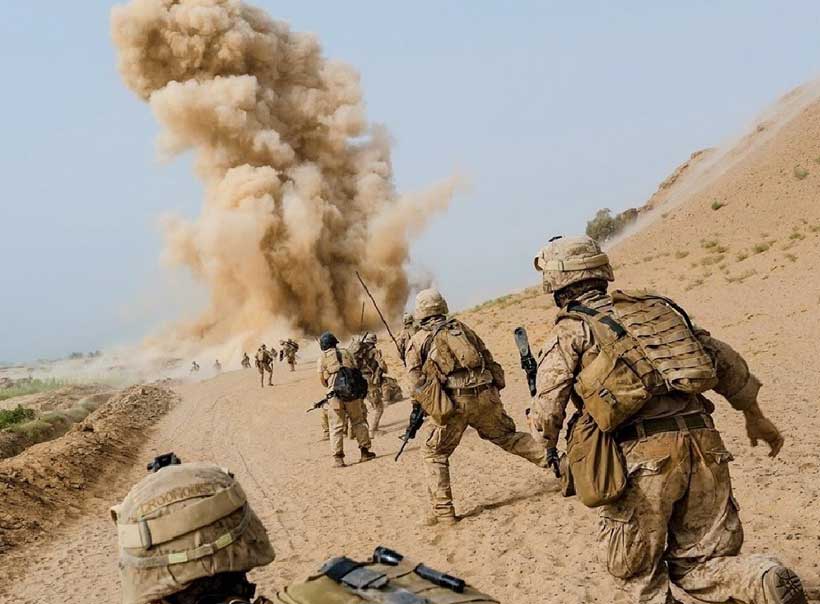
“In ten years or so, we’ll leak the truth,” the Dead Kennedys sang. “But by then it’s only so much paper.”
But it might just score you a Pulitzer Prize.
Award bait and bragging rights are no doubt the principal goals of The Washington Post’s self-congratulatory data dump, “The Afghanistan Papers.” As the headline implies, the 2000 pages that a court ordered the Office of the Special Inspector General for Afghanistan Reconstruction to release to Jeff Bezos’ newspaper paints a Robert McNamara-esque portrait of not-so-best-or-bright Bush and Obama Administration bozos privately admitting what they knew all along—that the U.S. invasion and occupation of Afghanistan was always an unwinnable, counterproductive mistake—at the same time they were telling the American people that victory in the post-9/11 “good war” was right around the corner. All we had to win was win Afghan hearts and minds.
“The [I.G.] documents also contradict a long chorus of public statements from U.S. presidents, military commanders and diplomats who assured Americans year after year that they were making progress in Afghanistan and the war was worth fighting,” the Post reported. “Several of those interviewed described explicit and sustained efforts by the U.S. government to deliberately mislead the public. They said it was common at military headquarters in Kabul—and at the White House—to distort statistics to make it appear the United States was winning the war when that was not the case.”
“The Afghanistan Papers” is a bright, shining lie by omission. Yes, our military and civilian leaders lied to us about Afghanistan. But they could never have spread their murderous BS—thousands of U.S. soldiers and tens of thousands of Afghans killed, trillions of dollars wasted—without media organizations like the Washington Post, which served as unquestioning government stenographers.
Press outlets like the Post and New York Times weren’t merely idiots used to disseminate pro-war propaganda. They actively censored people who knew we never should have gone into Afghanistan and tried to tell American voters the truth.
People like me.
I was among the tiny minority of journalists and commentators who opposed the Afghanistan war from the very beginning. Nine days after 9/11, I published the first of my cartoons pointing out that Al Qaeda was in Pakistan, not Afghanistan, so there was no moral or legal justification for invading. As the war dragged on I pointed out that the men and women in charge of the war didn’t have a clue about Afghanistan or the Afghan people. According to “The Afghanistan Papers,” those men and women knew they were screwing up, wouldn’t admit their ignorance and refused to bring in experts.
I went to Afghanistan to check things out for myself. It was obvious the U.S. didn’t stand a chance there. “The principal goal of this adventure in imperialistic vengeance, it seems obvious, should be to install a friendly government in Kabul. But we’re winning neither hearts nor minds among either the commoners or the leadership of the current regime apparent,” I wrote from Afghanistan on December 11, 2001. “And so we’ve lost this war, not because they’re good or we’re not, but because of who we are. The American Empire can’t spend the bodies or the time or the cash to fix this crazyass place, because in the final analysis, election-year W. was right—we’re not nation builders…we ought to tally our dead, write up our losses, and count ourselves lucky to still be called a superpower.” My piece, for The Village Voice, was titled “How We Lost Afghanistan.”
It was published eighteen years ago. But not in the Post. They didn’t want to hear what lefties like me had to say.
They still don’t.
Afghanistan was not a passing fancy for me. I wrote hundreds of essays and drew hundreds of cartoons urging an end to the madness. It was lonely. Even Democrats liked the Afghan war; they called it the right war while Iraq was the dumb one.
I went back to the country, traveling independently as an unembedded reporter, several times. I wrote the first book about the U.S. invasion of Afghanistan, the only book about oil pipeline politics in that country, a book placing Afghanistan in the context of Central Asia, and yet another book comparing the state of Afghanistan when Obama said we were pulling out—another lie—with how it was at the start of the war.
What was my reward for being right while everyone else was wrong? Hundreds of death threats. Getting fired by my client newspapers and magazines. It’s hard to believe now but back in 2004 George W. Bush was popular and being compared to Winston Churchill; that was the year that the “liberal” New York Times and Washington Post stopped running my work.
Major news outlets and book reviewers ignored my books. Editors refused to hire me. Producers wouldn’t book me. Anyone opposed to the Afghanistan war was censored from U.S. corporate media.
Not that Afghanistan was ignored. It was the subject of countless analysis pieces and opinion articles in American newspapers—all of it pro-war propaganda. There were thousands of television and radio stories about the Afghan war on radio and television. Corporate media repeatedly trotted out the same retired generals, former CIA officers, and random right-wing warmongers for quotes and analysis. Never, ever did they invite critics or opponents of U.S. interventionism in Afghanistan to share their thoughts with readers, listeners and viewers.
Nothing has changed. Whenever there is a foreign policy “crisis,” you will never read or hear or see someone completely opposed to U.S. involvement given a voice in the media. Certainly not in the Post.
So, 18 years and tens of thousands of lives and trillions of dollars too late, it’s nice to see the media finally shame these scumbags and their government handlers. But they ought to save a big portion of the blame for themselves.
(Ted Rall (Twitter: @tedrall), the political cartoonist, columnist and graphic novelist, is the author of “Francis: The People’s Pope.” You can support Ted’s hard-hitting political cartoons and columns and see his work first by sponsoring his work on Patreon.)
Troops “Fight for Freedom” — Against Whom?
We are constantly being told that American soldiers who serve in wars thousands of miles away on the other side of the world are “fighting for our freedoms.” Without exception, however, there is no evidence that any force we fight can actually attack US territory. So how on earth does that make sense? The truth is, American soldiers fight for one reason: to prop up unpopular dictatorships overseas.
SYNDICATED COLUMN: Russian Hacking: Where’s the Evidence?

At the smallest, crappiest newspaper in the world – even at a high school paper – no sane editor would publish a story that wasn’t backed by solid evidence. As the 20th century print journalism cliché goes, if your mother says she loves you check it out. So why are the nation’s most prestigious multi-Pulitzer-winning newsgathering organizations repeatedly claiming that hackers working for the Russian government stole emails belonging to the Democratic National Committee and Hillary Clinton campaign manager John Podesta, and gave them to WikiLeaks?
Because the CIA says so.
Well, not the actual CIA. Some unidentified people who claim to have seen some report say so.
The charge against Russia is explosive. “In a ‘closed-door briefing on Capitol Hill last week,’ intelligence officials told senators that it was now “quite clear’ that electing Trump was Russia’s goal,” according to Vox. Hothead Sarah Palin enabler and senior Arizona Senator John McCain called it “an act of war.”
Even Times op-ed columnist Paul Krugman — historically a voice of reason and prescience — dove into the neo-Red-baiting morass of this weird month, writing that “bad guys hacked the election” thanks to “useful idiots” (a Cold War slur used against lefties like, um, Krugman, pinned here to Trump and his advisors).
(Hypocrisy alert! I’ll save my catalog of covert U.S. attacks against other nations’ democratic elections — Obama’s role in the recent coup in Honduras comes to mind — for some future book, a format where word counts aren’t as constricting.)
 Anyway, newspapers and magazines and radio and television and Internet news sites say that Russia was behind the hacks. So, as my editor at the Columbia Daily Spectator would surely have asked, what is the basis of this contention?
Anyway, newspapers and magazines and radio and television and Internet news sites say that Russia was behind the hacks. So, as my editor at the Columbia Daily Spectator would surely have asked, what is the basis of this contention?
“The CIA.’s conclusion does not appear to be the product of specific new intelligence obtained since the election, several American officials, including some who had read the agency’s briefing, said on Sunday,” wrote the Times’ Mark Mazzetti and Eric Lichtblau. “Rather, it was an analysis of what many believe is overwhelming circumstantial evidence — evidence that others feel does not support firm judgments — that the Russians put a thumb on the scale for Mr. Trump, and got their desired outcome.”
The primary basis of this “overwhelming circumstantial evidence” appears to be that whoever hacked the DNC also hacked the RNC but only released the DNC stuff to WikiLeaks. “If the Russians were going to interfere, why on earth would they do it to the detriment of the candidate that was pro-Russian?” asked Adam Schiff of California, the ranking Democrat on the House Intelligence Committee.
My editor at the Spec would not have been impressed.
As Sam Biddle writes at The Intercept, “you can’t help but notice all of the qualifying words: Possibly, appears, connects, indicates.”
This is one of those awkward times when you have to admit that Donald Trump has a point: why should we take the CIA, whose BS Iraqi WMD intel led to the deaths of over a million people, at its word?
Why would the very same journalists who let themselves get duped 13 years ago dutifully transcribe what amounts to nothing more than unsubstantiated allegations?
I don’t know if Russia is innocent of hacking those emails — any more than the New York Times and the Washington Post and CBS News and so on know that they’re guilty.
No one knows.
Well, the CIA (and the hackers, if there indeed were hacks) might know. But if the spooks have any evidence, much less proof, they aren’t showing it to us or those idiotic media outlets. Which makes this an unsourced story — and one whose geopolitical implications, involving the world’s most heavily-armed nuclear states makes it incomprehensibly, irredeemably irresponsible to spread around.
If the government wants to warn us that a Russian puppet is about to move into the White House, they ought to take a cue from JFK, who went on television to show secret US spy photos of Soviet missiles in Cuba.
Show us the evidence or shut up.
As if this “Russia hacked the election” episode wasn’t enough to showcase the intellectual bankruptcy of America’s state-controlled news media, the stenographers are ignoring a far more credible explanation for how WikiLeaks got the Podesta/DNC emails: they were leaked, not hacked.
Craig Murray, a former British ambassador to Uzbekistan and WikiLeaks associate, told The Daily Mail that a DNC insider motivated by “disgust at the corruption of the Clinton Foundation and the tilting of the primary election playing field against Bernie Sanders” personally gave it to him in Washington. “Neither of [the leaks] came from the Russians,” Murray says. “The source had legal access to the information. The documents came from inside leaks, not hacks.”
Murray is a paragon of integrity, having sacrificed his diplomatic career in order to call out Islam Karimov, the sadistic tyrant of Uzbekistan known for boiling political dissidents to death and his cozy ties to the U.S. (His account “Murder in Samarkand” is highly recommended for its brutal honesty.)
Regardless of your politics, Murray is infinitely more believable than the CIA.
WikiLeaks chief Julian Assange confirms that “the Russian government is not the source.” Assange too has an impeccable reputation.
As far as I can tell, only one U.S. outlet, the right-wing Washington Times, has covered the Murray angle.
Everyone “knows” that Russia hacked the election. But it may or may not be true. To the contrary! The facts point to a leak.
There is “overwhelming circumstantial evidence” that the moral midgets of American corporate media don’t have the slightest interest in uncovering the truth. How perfect as we enter the Age of Trump.
(Ted Rall is author of “Trump: A Graphic Biography,” an examination of the life of the Republican presidential nominee in comics form. Please consider supporting Ted’s hard-hitting political cartoons and columns and see his work first by sponsoring his work on Patreon.)

